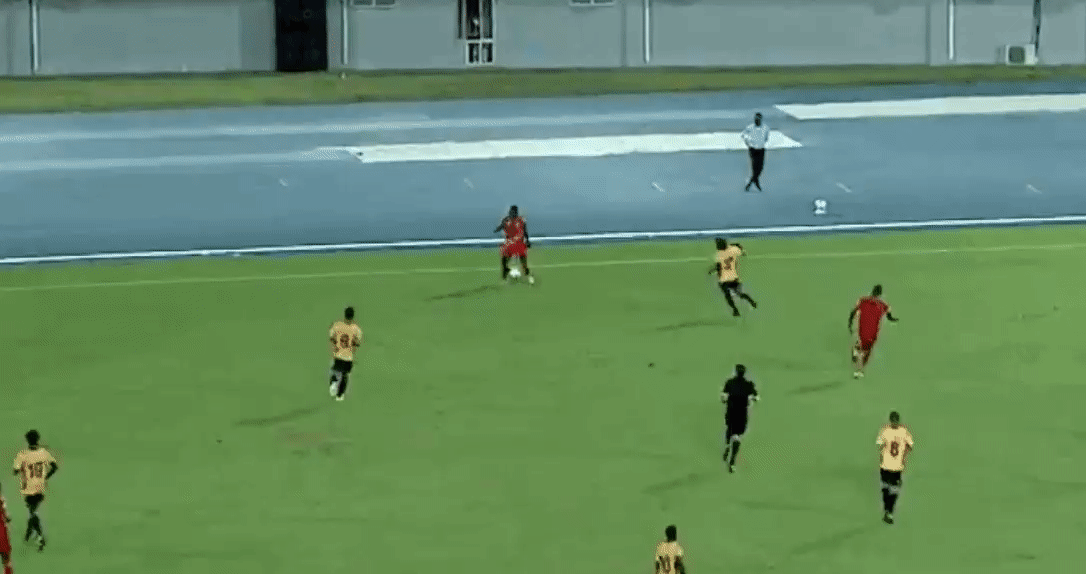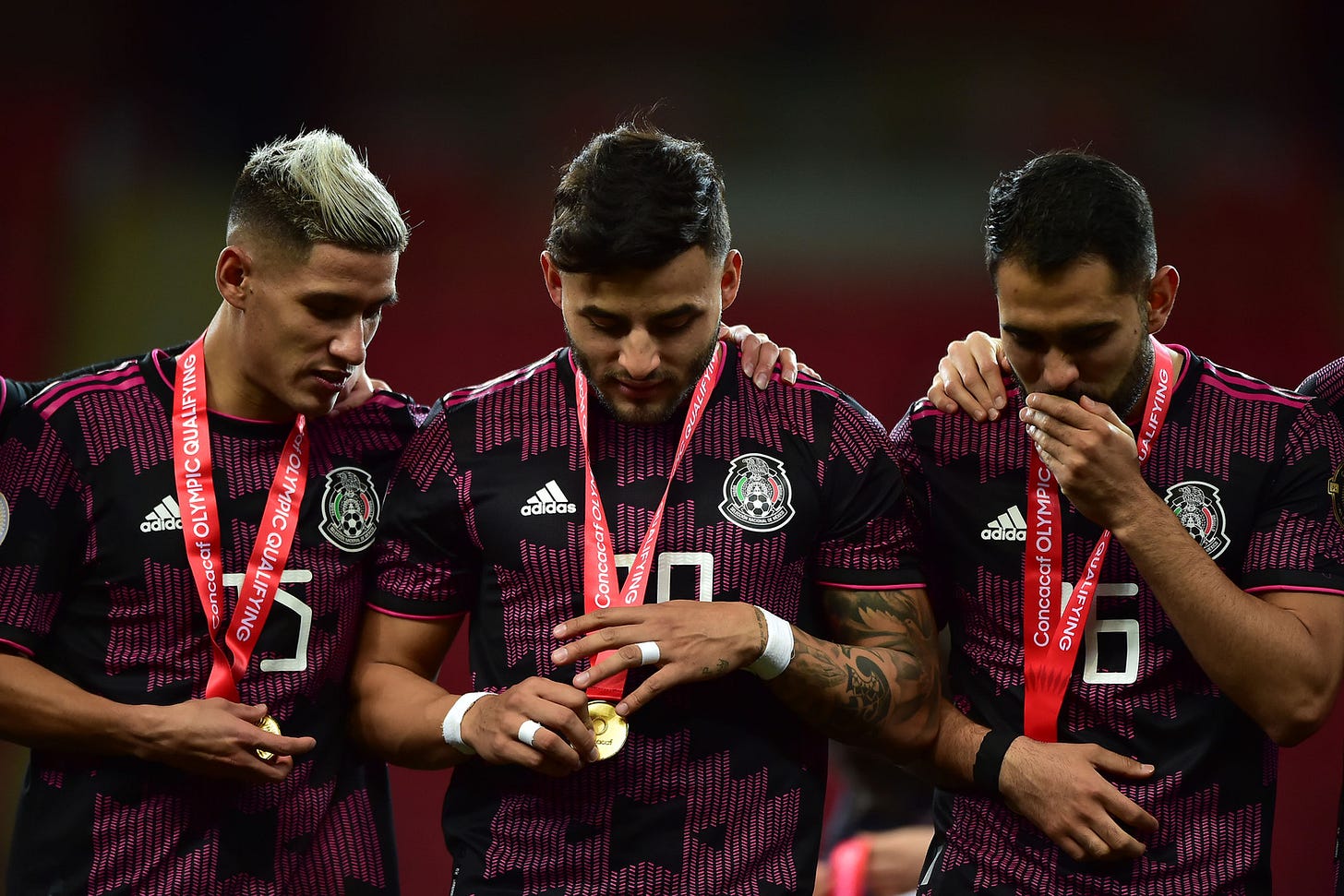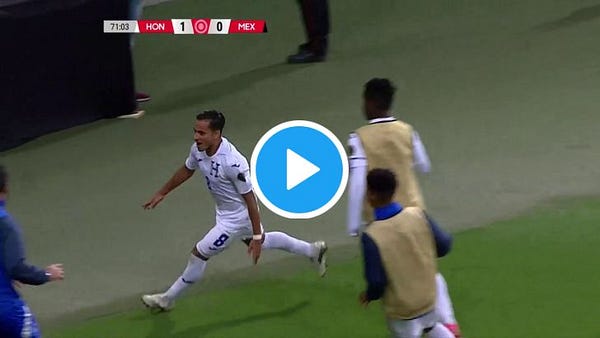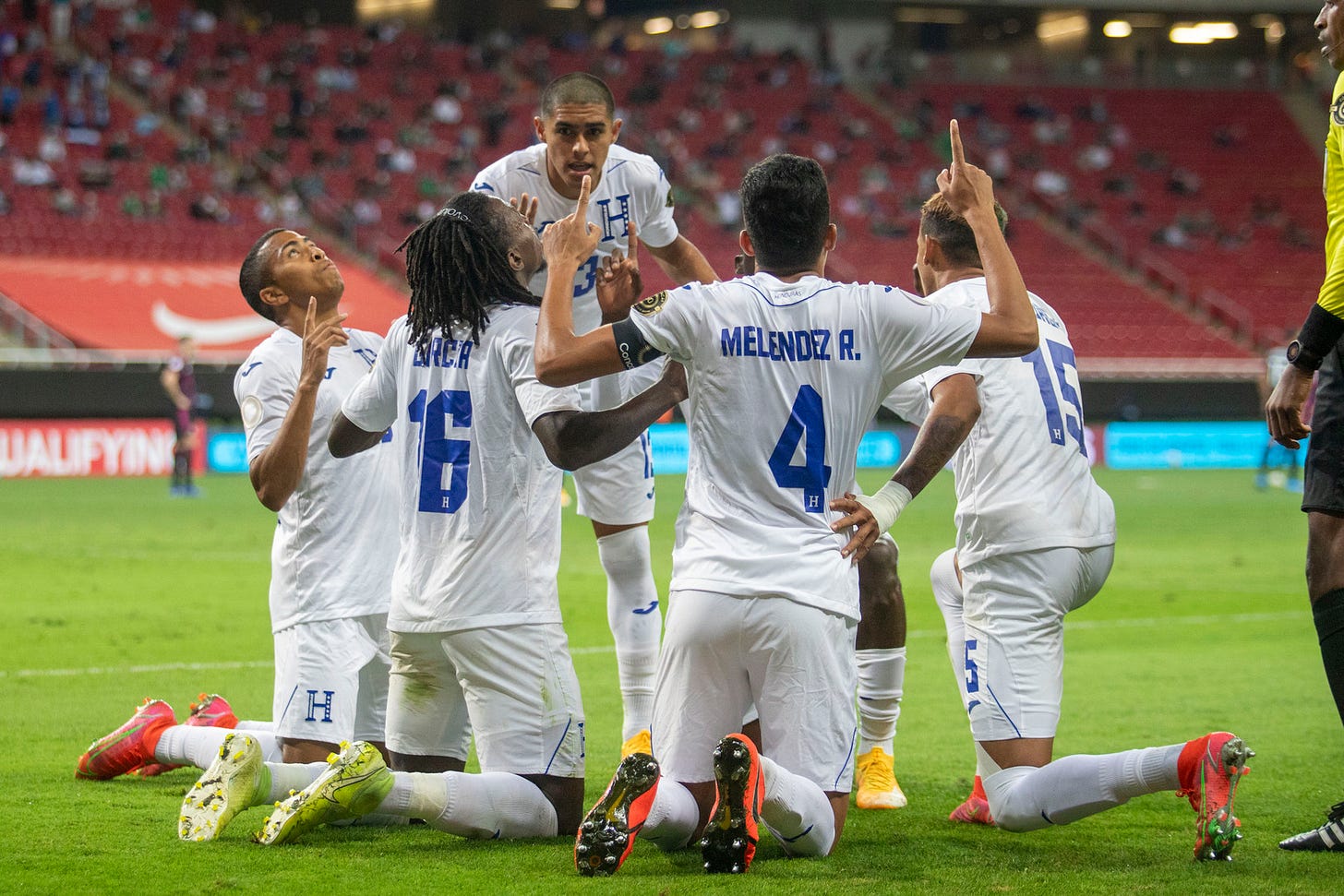🏆 - Who's sitting pretty after March's World Cup qualifiers?
and whose Qatar dreams are already dead?
Welcome new subscribers, whether you heard me on Futbol with Grant Wahl, the Total Soccer Show, en español con Cata Roque or found this newsletter in another way! If you’re not subscribed, you can remedy that by putting your email right here:
World Cup qualification in Concacaf got underway with a very chalk-y beginning. We then had a Saturday slate in which the favorites (all ‘away’ teams though most playing at neutral sites) absolutely rolled.
The drama sort of started on Sunday when Trinidad and Tobago managed only a draw with Puerto Rico and Montserrat got an 89th-minute equalizer from Lyle Taylor to draw with El Salvador.
Every ‘home’ team won Tuesday, progress for all six of those teams since the entire dozen participants in that day’s action lost their first game and needed to find their first points.
Thirty-five Concacaf members are eligible for the World Cup. Saint Lucia withdrew. Of the 34 remaining, eight already have been eliminated. That number will grow to 23 the night of June 8 and 26 later that month when the group winners from the six groups playing right now finish their two-legged series. From there, the Octagonal will be set, and we’ll see
Who will join them? A few teams definitely have the edge after their March matches, while others have work to do. Let’s look at where teams are at:
Teams that are rolling
🇨🇦 Canada - Any time you start out World Cup qualification with two matches and end with a 16-1 goal difference, you can chalk that up in the win column. No one in Concacaf can keep Alphonso Davies quiet for a full 90 minutes, and certainly no one in the first round of Concacaf qualification is up to the task. Add Cyle Larin, Lucas Cavallini and new face Theo Corbeanu into the mix, and it’s even tougher. Oh, plus they had to leave Jonathan David in France for this window. He should be back soon.
The question for the Canadian squad still is how things will hold up at the back, something that we won’t see tested until the final day of qualification when Canada meets…oh look!
🇸🇷 Suriname- Despite Canada’s excellent start, I still think June 8 against Suriname may be a nervous day for John Herdman.
Even before local reforms paved the way for Suriname’s massive recruitment push (the entire four-man midfield debuted against the Cayman Islands, as did goalkeeper Warner Hahn and others), the Natio attack had some weapons. Now that Gleofilo Vlijter, Ivenzo Comvalius and Nigel Hasselbaink are getting service from Roland Alberg on set pieces or benefitting from moves started deep by Ryan Donk, they’re even more dangerous.
Plus, they’ve added Rotherham United’s Florian Jozefzoon to the attack, one of a trio of talented players who sat out the 3-0 win over the Cayman Islands and helped in the 6-0 romp over Aruba, in which Hasselbaink had a hat trick.
Like an SEC team after September, they ain’t played nobody, but neither has Canada.
🇨🇼 Curacao - My impression is that Curacao would’ve liked to beat Cuba by more than 2-1, which is both a reflection of how difficult it can be to put up big numbers against some of the other teams in this round of qualification but also how much Curacao expects in this World Cup cycle.
Guus Hiddink probably needed to get a taste for some of the Central American and Caribbean away days, though Curacao enjoys the luxury of having the final-day showdown with Guatemala at home at the Ergilio Hato Stadium. He also needs to decide which of his attackers he needs on the field at the start of matches and exactly where they’re going to be. Dariel Morejón was great for Cuba at right back but he got a boost from Juninho Bacuna not being sure which spaces he was supposed to be popping up in.
This is nitpicking, though. Curacao has six points after a pair of impressive wins. They’re only going to get better, and they’re the favorite, for me, to get out of the group and then into the Octagonal.
🇰🇳 - St. Kitts and Nevis, somehow - I expected a surprise package out of Group F, and I’m surprised to find it’s St. Kitts and Nevis.
The Sugar Boyz are two for two, with wins against Puerto Rico and the Bahamas.


The match against Puerto Rico wasn’t broadcast anywhere, and it’s the more surprising result, so we’re not entirely sure how St. Kitts pulled it off, but their attacking depth was on display against the Bahamas, which couldn’t keep possession in the midfield and ended up conceding a plethora of chances.
The hard part is yet to come for St. Kitts, with Guyana and Trinidad and Tobago still on the schedule. Whoever gets out of Group F goes up against the Group A winner - likely still to be El Salvador - so there’s a path to the Octagonal if they want to go down it.
Teams that are in trouble
🇵🇦 Panama - Jon, Panama won both their March qualifiers. Didn’t you put them in the wrong category? No, I did not.
Panama was this close to drawing with Dominica in their second qualifier, a match that came after a win by the smallest margin over Barbados that should’ve put the fear of God into them.
After months of working with the squad, manager Thomas Christiansen has to understand now that some of the concepts he was able to put in place managing Leeds United aren’t going to fly here. Panama seemed in some ways to be fighting its instincts of how it played in the 2018 cycle, trying instead to execute the Danish boss’ game plan.
The generational change meant this campaign always would have some growing pains. Panama will have to hope they’re worked out soon or else the Dominican Republic can pounce and take advantage. The biggest step would be Gaby Torres, José Fajardo or even Eduardo Guerrero, who was not in this call-up, to catch fire and start banging in some goals. The forward line looked timid against Barbados and Dominica, rather than giving those defenders anything to worry about like they should have.
🇹🇹 - Trinidad and Tobago - I’m not going to take a victory lap for calling an upset since I thought it would come in the other game. Days after a convincing 3-0 win over Guyana, the Soca Warriors showed they’re not out of the woods yet, struggling to a 1-1 draw with Puerto Rico.
Levi Garcia is a player who can make a difference on his own, but his teammates seemed to feel that was his obligation rather than simply a bonus of having him on your team. Terry Fenwick’s side lacked imagination, and after a good showing against Guyana, Ryan Telfer fell off in the second game. Telfer eventually played a part in Joevin Jones’ goal, and Trinidad missed chances to go 2-0 before Puerto Rico’s lovely equalizer that saw Raul Gonzalez and Ricardo Rivera connect, but it was indicative of a lack of urgency in a game T&T needed to win.
The group is wide open, but Americans dreading another qualification trip to Couva (or Hasely Crawford Stadium in Port of Spain) can still consider a reprieve very possible.
Teams that are eliminated
Pour one out for: Aruba, the Cayman Islands, Cuba, the British Virgin Islands, Dominica, Anguilla, Turks and Caicos Islands, and the Bahamas. (Do it over a long period of time or you’ll be wasting a lot of your favorite beverage).
Some teams in this group will be able to count World Cup qualification a success if they can score a goal or grind out a single point in their June matches. This group obviously includes Anguilla, Concacaf’s lowest ranked team, and the British Virgin Islands. The Cayman Islands may do even better than that if Nations League is a guide.
Other teams already have something to build on. Dominica can certainly go out proud, losing matches to the two strongest teams in the group (the DR and Panama) and doing it by one goal each.
Cuba also can dream of better days, if the government setup continues to allow it, Onel Hernández made an immediate difference by scoring in his first start, and the rest of the foreign-based players clearly lifted the team’s level. It would be fascinating to see the team sustain a typical long-term project, led by Hernández, Jorge Luis Corrales, CaVaFe and others.
🏅 - Oh yeah, also Olympic qualification happened
You’ve probably read plenty about both Mexico winning the Olympic Qualification tournament and the United States’ failure to secure a spot in Tokyo after Honduras topped the Americans in Sunday’s semifinal.
The final of this tournament always has seemed a bit awkward since both teams already know they’re going to the tournament that the whole song and dance is designed to sort out. Mexico and Honduras didn’t approach Tuesday’s game that way, and got to enjoy the best match of the tournament.
The Honduras goal from Edwin Rodriguez provided a reminder that, just like Mexico and the U.S. had players who already are standing out on the domestic and international stage, so, too, do Los Catrachos.
Another thing I think this tournament shed some light on is just how seriously these competitions are taken by some federations. Mexico senior national team manager Tata Martino and his Honduras counterpart Fabian Coito each are extremely involved in the selection, tactics and training of the Olympic teams. Perhaps that’s down to their experiences of their home countries of Argentina and Uruguay.
Uruguay is a player development machine, but it can be difficult to replicate those conditions. While manager Óscar “El Maestro” Tabárez can regularly convene identification camps, given that nearly all prospects are already in the Montevideo area or can arrive quickly via bus, the United States has to cover far more ground. The good news for Americans is that there also are 325 million more people in the country, meaning more players to choose from.
Still, Mexico is also a huge country in terms of area, and it manages to convene frequent youth camps. The cozy relationship between the FMF and Liga MX ownership often can be a drawback for the national teams, but here it helps, with clubs willing to send their U-20 players to quick camps lasting a few days or longer ones like the U-20 camp Mexico conducted during the March FIFA date.
There’s a U-15 Mexico national team playing in a tournament this week with U-15 groups from seven Liga MX teams making up the rest of the field. Will all those players become professionals or still be the best of the best eight years from now? No, but some will, and they’ll have benefitted from the coaching and overall national team experience they’re having right now.
While the Uruguay model may not be something the U.S. can re-create, Honduras can do something similar. There are two population centers instead of just one, but the physical size is more manageable than the U.S. or Mexico.
That’s not to say Honduras needed Uruguayans to come in and fix their setup. This is a country that has now made it to the Olympics four consecutive times and has been to five of the last six Games.
I expressed some skepticism that this Honduras squad was as strong as past editions. That may show more in Tokyo than it did in Guadalajara, though perhaps they’ll once again prove me wrong and improve on their fourth-place finish in 2016.
Next week I’ll have a preview the Concacaf Champions League plus a feature on one of the most interesting coaches in the region, who is leading his team into the competition. Tell a friend or an acquaintance!











